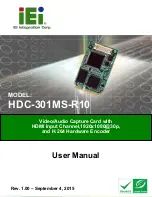
32
M2i.60xx / M2i.60xx-exp Manual
Linux
Software Driver Installation
Linux
Overview
The Spectrum M2i/M3i/M4i cards and digitizerNETBOX products are delivered with Linux drivers suitable for Linux installations based on
kernel 2.4, 2.6, 3.x or 4.x, single processor (non-SMP) and SMP systems, 32 bit and 64 bit systems. As each Linux distribution contains
different kernel versions and different system setup it is nearly every case necessary to have a directly matching kernel driver for card level
products to run it on a specific system. For digitizerNETBOX products the library is suffcient and no kernel driver has to be installed.
Spectrum delivers pre-compiled kernel driver modules for a number of common distributions with the cards. You may try to use one of these
kernel modules for different distributions which have a similar kernel version. Unfortunately this won’t work in most cases as most Linux system
refuse to load a driver which is not exactly matching. In this case it is possible to get the kernel driver sources from Spectrum. Please contact
your local sales representative to get more details on this procedure.
The Standard delivery contains the following pre-compiled kernel driver modules. This list may have been enhanced in between since printing
of the manual. If your specific Linux distribution is not in this list please download the latest drivers from our website.
The Linux drivers have been tested with all above mentioned distributions by Spectrum. Each of these distributions has been installed with the
default setup using no kernel updates. A lot more different distributions are used by customers with self compiled kernel driver modules.
Standard Driver Installation
The driver is delivered as installable kernel modules together with libraries to access the kernel driver. The installation script will help you with
the installation of the kernel module and the library.
This installation is only needed if you are operating locally installed cards. For remotely installed cards or for
digitizerNETBOX products it is only necessary to install the libraries as explained further below.
Login as root
It is necessary to have the root rights for installing a driver.
Call the install.sh <install_path> script
This script will install the kernel module and some helper scripts to a given directory. If you do not specify a directory it will use your home
directory as destination. It is possible to move the installed driver files later to any other directory.
The script will give you a list of matching kernel modules. Therefore it checks for the system width (32 bit or 64 bit) and the processor (single
or smp). The script will only show matching kernel modules. Select the kernel module matching your system. The script will then do the follow-
ing steps:
• copy the selected kernel module to the install directory (spcm.o or spcm.ko)
• copy the helper scripts to the install directory (spcm_start.sh and spc_end.sh)
• copy and rename the matching library to /usr/lib (/usr/lib/libspcm_linux.so)
Udev support
Once the driver is loaded it automatically generates the device nodes under /dev. The cards are automatically named to /dev/spcm0, /
dev/spcm1,...
Distribution
Kernel Version
Processor
Width
Distribution
Kernel Version
Processor
Width
Suse 9.3
2.6.11
single and smp
32 bit
Fedora Core 3
2.6.9
single and smp
32 bit
Suse 10.0
2.6.13
single only
32 bit and 64 bit
Fedora Core 4
2.6.11
single and smp
32 bit
Suse 10.1
2.6.16
single only
32 bit and 64 bit
Fedora Core 5
2.6.15
single and smp
32 bit and 64 bit
Suse 10.2
2.6.18
single and smp
32 bit and 64 bit
Fedora Core 6
2.6.18
single and smp
32 bit and 64 bit
Suse 10.3
2.6.22
single and smp
32 bit and 64 bit
Fedora Core 7
2.6.21
single and smp
32 bit and 64 bit
Suse 11.0
2.6.25
single and smp
32 bit and 64 bit
Fedora 8
2.6.23
single and smp
32 bit and 64 bit
Suse 11.1
2.6.27
single and smp
32 bit and 64 bit
Fedora 9
2.6.25
single and smp
32 bit and 64 bit
Suse 11.2
2.6.31
single and smp
32 bit and 64 bit
Fedora 10
2.6.27
single and smp
32 bit and 64 bit
Suse 11.3
2.6.34
single and smp
32 bit and 64 bit
Fedora 11
2.6.29
single and smp
32 bit and 64 bit
Suse 11.4
2.6.38
single and smp
32 bit and 64 bit
Fedora 12
2.6.31
single and smp
32 bit and 64 bit
Suse 12.1
3.1
single and smp
32 bit and 64 bit
Fedora 13
2.6.33.3
single and smp
32 bit and 64 bit
Suse 12.2
3.4.6
single and smp
32 bit and 64 bit
Fedora 14
2.6.35.6
single and smp
32 bit and 64 bit
Suse 12.3
3.7.0
single and smp
32 bit and 64 bit
Fedora 15
2.6.38.6
single and smp
32 bit and 64 bit
Suse 13.1
3.11.6
single and smp
32 bit and 64 bit
Fedora 16
3.1
single and smp
32 bit and 64 bit
Suse 13.2
3.16.6
single and smp
32 bit and 64 bit
Fedora 17
3.3.4
single and smp
32 bit and 64 bit
Fedora 18
3.6.10
single and smp
32 bit and 64 bit
Debian Sarge
2.4.27
single
32 bit
Fedora 19
3.9.5
single and smp
32 bit and 64 bit
Debian Sarge
2.6.8
single
32 bit
Fedora 20
3.11.10
single and smp
32 bit and 64 bit
Debian Etch
2.6.18
single and smp
32 bit and 64 bit
Fedora 21
3.17.4
single and smp
32 bit and 64 bit
Debian Lenny
2.6.26
single and smp
32 bit and 64 bit
Fedora 22
4.0.4
single and smp
32 bit and 64 bit
Debian Squeeze
2.6.32
single and smp
32 bit and 64 bit
Debian Wheezy
3.2.41
single and smp
32 bit and 64 bit
Ubuntu 12.04 LTS
3.2
single and smp
32 bit and 64 bit
Debian Jessie
3.16.7
single and smp
32 bit and 64 bit
Ubuntu 14.04 LTS
3.15.0
single and smp
32 bit and 64 bit















































